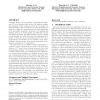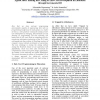164 search results - page 19 / 33 » The art and science of game programming |
SIGGRAPH
2009
ACM
14 years 1 months ago
2009
ACM
Over the past few decades, the arts have become increasingly dependent on and influenced by the development of computer technology. In the 1960s pioneering artists experimented w...
FUNGAMES
2010
13 years 8 months ago
2010
Recent work in neuroscience suggests that there is a common coding in the brain between perception, imagination and execution of movement. Further, this common coding is considere...
ICALP
2004
Springer
14 years 24 days ago
2004
Springer
We first consider infinite two-player games on pushdown graphs. In previous work, Cachat, Duparc and Thomas [4] have presented a winning decidable condition that is Σ3-complete ...
SIGCSE
2009
ACM
14 years 2 months ago
2009
ACM
Jeannette Wing’s call for teaching Computational Thinking (CT) as a formative skill on par with reading, writing, and arithmetic places computer science in the category of basic...
VL
2006
IEEE
14 years 1 months ago
2006
IEEE
Now that we have end-user programming environments capable of empowering kids with no programming background to build games in a matter of hours, a new quest for raising the ceili...



